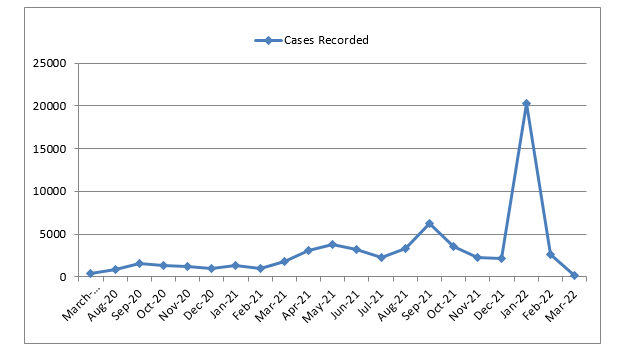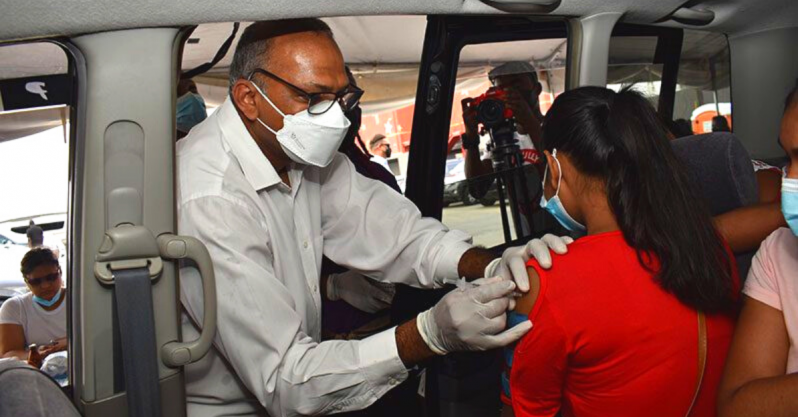By Shamar Meusa
CREATING a sustainable balance between the health and safety of the population, and the strength of the economy is essential in managing a pandemic that forces periodic shutdowns and national curfews.
Minister of Health, Dr Frank Anthony made this observation in an exclusive interview with the Guyana Chronicle on Friday.
Minister Anthony was asked to address the Dr Irfaan Ali-led administration’s management of the pandemic as this March 11 marks year two since Guyana’s first recorded COVID-19 case.
COVID-19 was declared a global pandemic by the World Health Organization (WHO) on March 11, 2020. On this day, Guyana recorded its first case and death by the contagious respiratory virus.
The country’s index case was a 52-year-old woman who travelled to Guyana from Queens, New York six days prior to her death.
When the virus’s presence in Guyana was first recorded, the country was still awaiting the results of the 2020 General and Regional Elections (GRE), which would eventually conclude within six months.
Since then, the assent to office of President Dr Irfaan Ali and his government marked an impending shift in the management of the pandemic as the People’s Progressive Party/Civic (PPP/C) while in political opposition had raised many concerns.
Early Stages and Changes
During the early stages of the outbreak in Guyana, a very low number of cases were recorded in the country, largely attributed to a low number of tests being conducted by the then-Ministry of Public Health, headed by subject minister, Volda Lawrence.
This led many to a distorted idea of virus’s spread across the country.
In his interview, Dr Anthony said when he was appointed Health Minister in August 2020, his team immediately recognised the country’s poor testing numbers as approximately five Polymerase Chain Reaction (PCR) tests were being done every day.
Dr Anthony recalled there were also restrictions on how those tests could be used which limited the use of PCRs as not everyone who believed they were exposed was eligible for testing.
He knew this had to change. On average, he contended, when samples were taken to the National Public Health Reference Lab (NPHRL), results from the tests were returned to those persons within seven to eight days.
The use of an old PCR machine also lengthened the process, Dr Anthony added further. His intention was to transition the testing method from a manual method to an automated system which would speed up the turnover time for results and return them sooner to persons who tested.
At this point, 2000 tests can be done within 24-hours which, the Health Minister contends, is a marked improvement from what obtained under the previous system.

Emergency Health Measures
As far as the laws surrounding managing the pandemic, Minister Anthony said in the first stages of the pandemic, the emergency health measures implemented by the previous A Partnership for National Unity + Alliance For Change (APNU+AFC) government were ineffective as they were too rigid and persons did not comply.
Dr Anthony plugged the need for public education to complement any set of emergency health measures.
As far as balancing the economy and public health is concerned, the Health Minister in his time was to ensure persons in Guyana could return to their income-generating activities and do so in a safe way while ensuring public safety.
This, he said, required stakeholder engagement and education on why they should follow the government-mandated emergency health measures.
While other countries implemented rigid lockdown measures, Dr Anthony further added, these periods of lockdown were sometimes followed by a surge in COVID-19 cases once the countries reopened.
Guyana instead opted for a gradual opening of the country while monitoring and building the health system to ensure that if persons did get sick, there would not be a burden, Dr Anthony explained.
“Because of that approach, at no point was our healthcare system overwhelmed because we had adequate amount of beds at the hospital level, and we made sure that we bought medication to be able to treat people; and then of course, we introduced vaccination,” the Minister of Health indicated.
Added to that, Dr Anthony said his colleagues in government recognised Guyana’s existing Public Health Ordinance had provided for the Central Board of Health’s role in pandemic management and created provisions for this.
Where is Guyana now?

When asked if the country is nearing the endemic stage of the virus, the health minister noted that that will have to be reviewed.
He explained that with diseases there are three broad categories ranked by severity of spread and impact: pandemic, epidemic, and endemic.
“So moving from a pandemic, where almost all of the countries in the world have been affected, we will first want to move from there to bring it to an epidemic, and then probably to an endemic.
“So, I think with the level of vaccinations and the different waves of variants that we have had, we will have to monitor and see how the immunity that people would have developed is holding,” Dr Anthony said, adding: “I think we would see that shift from pandemic to epidemic and then eventually to endemic.”
Dr Anthony bemoaned there are still parts of the world where many persons have not accessed the vaccine which hinders the global move from pandemic to epidemic. Continued vaccinations globally would eventually help Guyana move to an endemic stage, he concluded.



.jpg)











